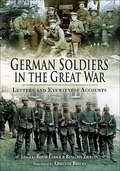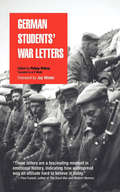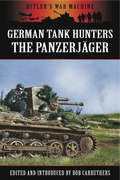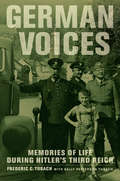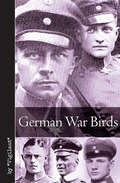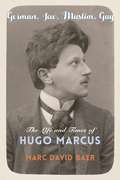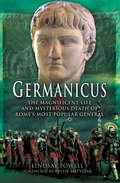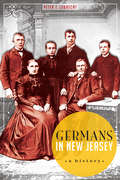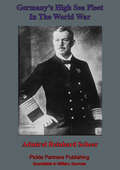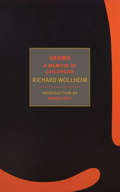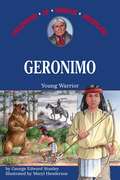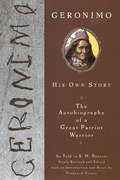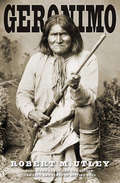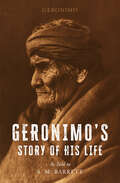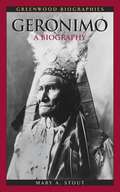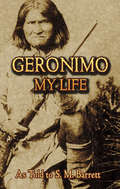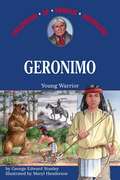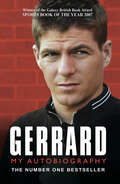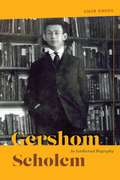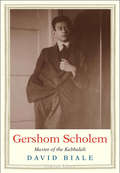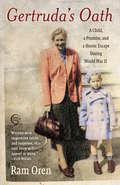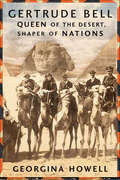- Table View
- List View
German Soldiers in the Great War: Letters and Eyewitness Accounts
by Jay Winter Benjamin Ziemann Bernd UlrichThe first English translation of writings that capture the lives and thoughts of German soldiers fighting in the trenches and on the battlefields of WWI. German Soldiers in the Great War is a vivid selection of firsthand accounts and other wartime documents that shed new light on the experiences of German frontline soldiers during the First World War. It reveals in authentic detail the perceptions and emotions of ordinary soldiers that have been covered up by the smokescreen of official military propaganda about “heroism” and “patriotic sacrifice.” In this essential collection of wartime correspondence, editors Benjamin Ziemann and Bernd Ulrich have gathered more than two hundred mostly archival documents, including letters, military dispatches and orders, extracts from diaries, newspaper articles and booklets, medical reports and photographs. This fascinating primary source material provides the first comprehensive insight into the German frontline experiences of the Great War, available in English for the first time in a translation by Christine Brocks.
German Students' War Letters
by Jay Winter A. F. Wedd Philipp WitkopOriginally appearing at the same time as the pacifist novel All Quiet on the Western Front, this powerful collection provides a glimpse into the hearts and minds of an enemy that had been thoroughly demonized by the Allied press. Composed by German students who had left their university studies in order to participate in World War I, these letters reveal the struggles and hardships that all soldiers face.The stark brutality and surrealism of war are revealed as young men from Germany describe their bitter combat and occasional camaraderie with soldiers from many nations, including France, Great Britain, and Russia. Like its companion volume, War Letters of Fallen Englishmen, these letters were carefully selected for their depth of perception, the intensity of their descriptions, and their messages to future generations. "Should these letters help towards the establishment of justice and better understanding between nations," the editor reflects in his introduction, "their deaths will not have been in vain." This edition contains a new foreword by the distinguished World War I historian Jay Winter.
German Tank Hunters: The Panzerjäger (Hitler's War Machine)
by Bob CarruthersThis unique collection of contemporary combat accounts provides a primary source insight into the reality of anti-tank warfare on the Eastern Front. Both armoured and infantry based operations are considered.This book is part of the 'Hitler's War Machine' series, a new military history range compiled and edited by Emmy Award winning author and historian Bob Carruthers. The series draws on primary sources and contemporary documents to provide a new insight into the true nature of Hitler's Wehrmacht.The series consultant is David Mcwhinnie creator of the award winning PBS series 'Battlefield'.
German Voices: Memories of Life during Hitler's Third Reich
by Sally Patterson Tubach Frederic C. TubachWhat was it like to grow up German during Hitler's Third Reich? In this extraordinary book, Frederic C. Tubach returns to the country of his roots to interview average Germans who, like him, came of age between 1933 and 1945. Tubach sets their recollections and his own memories into a broad historical overview of Nazism--a regime that shaped minds through persuasion (meetings, Nazi Party rallies, the 1936 Olympics, the new mass media of radio and film) and coercion (violence and political suppression). The voices of this long-overlooked population--ordinary people who were neither victims nor perpetrators--reveal the rich complexity of their attitudes and emotions. The book also presents selections from approximately 80,000 unpublished letters (now archived in Berlin) written during the war by civilians and German soldiers. Tubach powerfully provides new insights into Germany's most tragic years, offering a nuanced response to the abiding question of how a nation made the quantum leap from anti-Semitism to systematic genocide.
German War Birds (Vintage Aviation Library)
by Claude W. SykesDramatic true stories of air combat featuring Germany&’s greatest pilots: &“AWorld War I aviation history classic&” (Over the Front). In these riveting accounts, Manfred von Richthofen, Max Immelmann, Oswald Boelcke, and other famous daredevil flyers are joined by lesser-known but equally resourceful colleagues such as Rudolf von Eschwege and Hans Schüz as they take part in furious battles in the sky—and close escapes on the ground when brought down on the wrong side of the lines. German War Birds contains some of the earliest information to appear after the war about air combat in the Middle East and Russia, as well as the Western Front, and about the significance of observation balloons as targets that were viciously attacked. The author focuses on the heart of the action and recreates the experiences of the airborne war with immediacy and excitement—drawing the reader into events as they happen.
German, Jew, Muslim, Gay: The Life and Times of Hugo Marcus (Religion, Culture, and Public Life)
by Marc David BaerHugo Marcus (1880–1966) was a man of many names and many identities. Born a German Jew, he converted to Islam and took the name Hamid, becoming one of the most prominent Muslims in Germany prior to World War II. He was renamed Israel by the Nazis and sent to the Sachsenhausen concentration camp before escaping to Switzerland. He was a gay man who never called himself gay but fought for homosexual rights and wrote queer fiction under the pen name Hans Alienus during his decades of exile.In German, Jew, Muslim, Gay, Marc David Baer uses Marcus’s life and work to shed new light on a striking range of subjects, including German Jewish history and anti-Semitism, Islam in Europe, Muslim-Jewish relations, and the history of the gay rights struggle. Baer explores how Marcus created a unique synthesis of German, gay, and Muslim identity that positioned Johann Wolfgang von Goethe as an intellectual and spiritual model. Marcus’s life offers a new perspective on sexuality and on competing conceptions of gay identity in the multilayered world of interwar and postwar Europe. His unconventional story reveals new aspects of the interconnected histories of Jewish and Muslim individuals and communities, including Muslim responses to Nazism and Muslim experiences of the Holocaust. An intellectual biography of an exceptional yet little-known figure, German, Jew, Muslim, Gay illuminates the complexities of twentieth-century Europe’s religious, sexual, and cultural politics.
Germanicus: The Magnificent Life and Mysterious Death of Rome's Most Popular General
by Lindsay Powell&“The story of a Roman Emperor that might have been&” (Fighting Times). Germanicus was regarded by many Romans as a hero in the mold of Alexander the Great. His untimely death, in suspicious circumstances, ended the possibility of a return to a more open republic. This, the first modern biography of Germanicus, is in parts a growing-up story, a history of war, a tale of political intrigue, and a murder mystery. In this highly readable, fast paced account, historical detective Lindsay Powell details Germanicus&’s campaigns and battles in Illyricum and Germania; tracks him on his epic tour of the Eastern Mediterranean to Armenia and down the Nile; evaluates the possible causes of his death; and reports on the cruel fate his wife, Agrippina, and their children suffered at the hands of Praetorian Guard commander, and Tiberius&’s infamous deputy, Aelius Sejanus.
Germans in New Jersey: A History (American Heritage)
by Peter T. LubrechtGerman immigrants and their descendants are integral to New Jersey's history. When the state was young, they founded villages that are now well-established communities, such as Long Valley. Many German immigrants were lured by the freedom and opportunity in the Garden State, especially in the nineteenth century, as they escaped oppression and revolution. German heroes have played a patriotic part in the state's growth and include scholars, artists, war heroes and industrialists, such as John Roebling, the builder of the Brooklyn Bridge, and Thomas Nast, the father of the American cartoon. Despite these contributions, life in America was not always easy; they faced discrimination, especially during the world wars. But in the postwar era, refugees and German Americans alike--through their Deutsche clubs, festivals, societies and language schools--are a huge part of New Jersey's rich cultural tapestry.
Germany's High Sea Fleet In The World War (Barnes and Noble Digital Library)
by Anon. Admiral Reinhard ScheerIncludes 26 illustrations, battle maps and portraits of the Naval War 1914-1918Known to his own sailors as the "Man with the Iron Mask", Admiral Reinhard Scheer was a hardened dedicated sailor. It was his relentless drive that enabled him to overcome his limited social background and gain the highest rank in the Kaiserliche Marine. His memoirs are of great interest to historians of the First World War and the nascent German 'Great Power' status.Broadly divided into three sections, the first part of his memoirs concentrates on the German Fleet's activities during the first years of the war, including the bombardment of the coast of Britain, which came as such a shock to the Allies. The second, which naturally dominates his memoirs, are his great exploits at the Battle of Jutland or Skaggerak in command of the cruiser squadron which caused such damage to the British Fleet. The third and final part recounts his time as chief of staff of the German Navy, as an advocate of unrestricted Naval Warfare he recounts his lobbying of the Emperor and the methods and experiences of the U-Boats under his command.A thoroughly gripping Naval read.Author -- Admiral Reinhard Scheer (1863-1928)Translator -- Anon.Text taken, whole and complete, from the edition published in New York [etc.] Cassell and company, ltd., 1920.Original Page Count - xiv and 375 pages.
Germs: A Memoir of Childhood (G - Reference,information And Interdisciplinary Subjects Ser.)
by Richard WollheimA brilliant, meandering exploration of family and childhood memory by one of the most original British philosophers of the twentieth century.Germs is about first things, the seeds from which a life grows, as well as about the illnesses it incurs, the damage it sustains. Written at the end of the life of Richard Wollheim, a major British philosopher of the second half of the twentieth century, this memoir is not the usual story of growing up, but very much about childhood, that early world we all share in which we do not not know either the world or ourselves for sure, and in which things--houses, clothes, meals, parents, the past--loom large around us, seeming both inevitable and uncontrollable. Richard Wollheim's remarkable, moving, and entirely original book recovers this formative moment that makes us who we are before we really are who we are and that haunts us all our lives in lucid and lyrical prose.
Geronimo
by Meryl Henderson George E. StanleyIn this illustrated biography, young Apache Goyahkla and his friend play games in their village that will prepare him for his role as a hunter and warrior--and the place he will hold in history as Geronimo, fighter for the rights of his people.
Geronimo
by GeronimoEnter the world of Geronimo Stilton, where another funny adventure is always right around the corner. Each book is a fast-paced adventure with lively art and a unique format kids 7-10 will love. Ah, there's nothing like a relaxing vacation on the beach! I would spread out by the crystal-clear water with a good book. What more could a mouse want? At least, that was the plan. But somehow, my vacations never seem to go according to plan. Instead of a beautiful seaside resort, I found myself in a fleabag hotel that was falling down around my ears! Oh, would I ever be able to relax and enjoy my vacation??
Geronimo (Cornerstones of Freedom)
by Zachary KentA biography of the Apache warrior who led attacks on settlers and soldiers in Mexico and the Southwestern United States during the 1870s and 1880s.
Geronimo (The Lamar Series in Western History)
by Robert M. UtleyThis &“meticulous and finely researched&” biography tracks the Apache raider&’s life from infamous renegade to permanent prisoner of war (Publishers Weekly). Notorious for his ferocity in battle and uncanny ability to elude capture, the Apache fighter Geronimo became a legend in his own time and remains an iconic figure of the nineteenth century American West. In Geronimo, renowned historian Robert M. Utley digs beneath the myths and rumors to produce an authentic and thoroughly researched portrait of the man whose unique talents and human shortcomings swept him into the fierce storms of history. Utley draws on an array of newly available sources, including firsthand accounts and military reports, as well as his geographical expertise and deep knowledge of the conflicts between whites and Native Americans. This highly accurate and vivid narrative unfolds through the alternating perspectives of whites and Apaches, arriving at a more nuanced understanding of Geronimo&’s character and motivation than ever before. What was it like to be an Apache fighter-in-training? Why was Geronimo feared by whites and Apaches alike? Why did he finally surrender after remaining free for so long? The answers to these and many other questions fill the pages of this authoritative volume.
Geronimo's Story of His Life: As Told to S. M. Barrett
by Geronimo S. M. BarrettA pivotal piece of nineteenth-century Native American history from a tireless warrior seeking justice for his people. Storied leader of the Bedonkohe band of the Chiricahua Apache tribe, Geronimo led resistance against Mexican and American troops seeking to drive the Apache from their land during the 1850s through the 1880s. In 1886, he finally surrendered to the US Army and became a prisoner of war. Although he would never return to his homeland, Geronimo became an iconic figure in Native American society and even had the honor of riding with President Theodore Roosevelt in his 1905 inaugural parade. That same year, he agreed to share his story with Stephen M. Barrett, a superintendent of education from Lawton, Oklahoma. In Geronimo&’s own words, this is his fascinating life story. Beginning with an Apache creation myth, he discusses his youth and family, the bloody conflicts between Mexico and the United States, and his two decades of life as a prisoner. Revered by his people and feared by his enemies, Geronimo narrates his memoir with a compassionate and compelling voice that still resonates today.
Geronimo: A Biography
by Mary A. StoutApache warrior Geronimo led one of the last major independent Indian uprisings, and personified the struggle of Native Americans during westward expansion. Aimed at high school and undergraduate students, this biography provides an account of Geronimo's life from his traditional Apache upbringing to his final days as a celebrity prisoner of war, within the context of key historical and cultural events of his lifetime, including Native American traditions. The biography draws on primary sources such as Geronimo's autobiography and contemporary newspaper accounts, and is illustrated with b&w historical photos. A timeline and a glossary are also included. Stout is a librarian at Pima Community College in Tucson. She has published six books on Native American tribes. Annotation c2010 Book News, Inc., Portland, OR (booknews.com)
Geronimo: My Life (Native American)
by Geronimo S. M. BarrettIn this, one of Native American history's most extraordinary documents, a legendary warrior and shaman recounts the beliefs and customs of his people. Completely and utterly authentic, its captivating narrator is the most famous member of the Apache tribe: Geronimo.The spiritual and intellectual leader of the American Indians who defended their land from both Mexico and the United States for many years, Geronimo surrendered in 1886. Two decades later, while under arrest, he told his story through a native interpreter to S. M. Barrett, an Oklahoma school superintendent. Barrett explains in his introduction, "I wrote to President Roosevelt that here was an old Indian who had been held a prisoner of war for twenty years and had never been given a chance to tell his side of the story, and asked that Geronimo be granted permission to tell for publication, in his own way, the story of his life."This remarkable testament is the result. It begins with Geronimo's retelling of an Apache creation myth and his descriptions of his youth and family. He explains his military tactics as well as traditional practices, including hunting and religious rituals, and reflects upon his hope for the survival of his people and their culture.
Geronimo: The Inspiring Life Story of an Apache Warrior (Inspiring Stories)
by Brenda HaugenGeronimo was one of the fiercest Apache warriors of all time. He was both admired and feared as he spent years fighting to preserve the Apache way of life in the American Southwest.
Geronimo: Young Warrior
by George E. StanleyYoung Apache Goyahkla and his friend play games in their village that will prepare him for his role as a hunter and warrior-- and the place he will hold in history as Geronimo, fighter for the rights of his people.
Gerrard: My Autobiography
by Steven GerrardSteven Gerrard is a hero to millions, not only as the inspirational captain of Liverpool FC, but as a key member of the England team. Here, for the first time, he tells the story of his lifelong obsession with football, in an honest and revealing book which captures the extraordinary camaraderie, the soul-destroying tensions and the high-octane thrills of the modern game as never before.Born in the Liverpool suburb of Huyton in 1980, Steven first joined Liverpool as a YTS trainee and played his first game for the first team aged just 18. His career has gone from strength to strength ever since and he is now the team's captain and its lynchpin. Liverpool's incredible comeback in the Champions' League final in Istanbul in May 2005, recovering from a 3-goal deficit against AC Milan to win on penalties, is testament to the amazing power Gerrard has over his team. His presence on the pitch is a force to be reckoned with and places him amongst the very first rank of players in the world.A relatively private figure, Steven has rarely spoken out in public. Now, his legions of fans will be allowed an intimate glimpse of what makes their hero tick. He speaks for the first time about the torturous will-he-won't-he Chelsea rumours and his undying passion for Liverpool. We experience first-hand the highs of winning in Istanbul and elsewhere, as well as the occasional lows of being parted from his much-loved family and friends. And of course, the book contains a full blow-by-blow account of England's world cup campaign in Germany 2006.Steven Gerrard's book is the definitive football autobiography. Like its subject, it's honest, passionate and exhilarating. If Steven Gerrard isn't your hero yet, by the time you've read this he will be...
Gershom Scholem: An Intellectual Biography
by Amir EngelGershom Scholem (1897–1982) was ostensibly a scholar of Jewish mysticism, yet he occupies a powerful role in today’s intellectual imagination, having an influential contact with an extraordinary cast of thinkers, including Hans Jonas, Martin Buber, Walter Benjamin, Hannah Arendt, and Theodor Adorno. In this first biography of Scholem, Amir Engel shows how Scholem grew from a scholar of an esoteric discipline to a thinker wrestling with problems that reach to the very foundations of the modern human experience. As Engel shows, in his search for the truth of Jewish mysticism Scholem molded the vast literature of Jewish mystical lore into a rich assortment of stories that unveiled new truths about the modern condition. Positioning Scholem’s work and life within early twentieth-century Germany, Palestine, and later the state of Israel, Engel intertwines Scholem’s biography with his historiographical work, which stretches back to the Spanish expulsion of Jews in 1492, through the lives of Rabbi Isaac Luria and Sabbatai Zevi, and up to Hasidism and the dawn of the Zionist movement. Through parallel narratives, Engel touches on a wide array of important topics including immigration, exile, Zionism, World War One, and the creation of the state of Israel, ultimately telling the story of the realizations—and failures—of a dream for a modern Jewish existence.
Gershom Scholem: Master of the Kabbalah (Jewish Lives)
by David BialeA new biography of the seminal twentieth-century historian and thinker who pioneered the study of Jewish mysticism and profoundly influenced the Zionist movement Gershom Scholem (1897–1982) was perhaps the foremost Jewish intellectual of the twentieth century. Pioneering the study of Jewish mysticism as a legitimate academic discipline, he overturned the rationalist bias of his predecessors and revealed an extraordinary world of myth and messianism. In his youth, he rebelled against the assimilationist culture of his parents and embraced Zionism as the vehicle for the renewal of Judaism in a secular age. He moved to Palestine in 1923 and participated in the creation of the Hebrew University, where he was a towering figure for nearly seventy years. David Biale traces Scholem’s tumultuous life of political activism and cultural criticism, including his falling-out with Hannah Arendt over the Eichmann trial. Mining a rich trove of diaries, letters, and other writings, Biale shows that his subject’s inner life illuminates his most important writings. Scholem emerges as a passionately engaged man of his times—a period that encompassed two world wars, the rise of Nazism, and the Holocaust.
Gertruda's Oath: A Child, a Promise, and a Heroic Escape During World War II
by Ram OrenTrapped in the horrors of World War II, a woman and a child embark on a journey of survival in this page-turning true story that recalls the power and the poignancy ofSchindler’s List. Michael Stolowitzky, the only son of a wealthy Jewish family in Poland, was just three years old when war broke out and the family lost everything. His father, desperate to settle his business affairs, travels to France, leaving Michael in the care of his mother and Gertruda Bablinska, a Catholic nanny devoted to the family. When Michael's mother has a stroke, Gertruda promises the dying woman that she will make her way to Palestine and raise him as her own son. Written with the invaluable assistance of Michael, now seventy-two and living in New York City, GERTRUDA’S OATH re-creates Michael and Gertruda’s amazing journey. Gripping vignettes bring to life the people who helped ensure their survival, including SS officer Karl Rink, who made it his mission to save Jews after his own Jewish wife was murdered; Rink’s daughter, Helga, who escaped to a kibbutz, where she lived until her recent death; and the Jewish physician Dr. Berman, who aided Michael and Gertruda through the worst of times. GERTRUDA’S OATH is a story of extraordinary courage and moral strength in the face of horrific events. LikeSchindler’s List, it transcends history and religion to reveal the compassion and hope that miraculously thrives in a world immersed in war without end.
Gertrude Bell: Queen of the Desert, Shaper of Nations
by Georgina HowellA marvelous tale of an adventurous life of great historical importShe has been called the female Lawrence of Arabia, which, while not inaccurate, fails to give Gertrude Bell her due. She was at one time the most powerful woman in the British Empire: a nation builder, the driving force behind the creation of modern-day Iraq. Born in 1868 into a world of privilege, Bell turned her back on Victorian society, choosing to read history at Oxford and going on to become an archaeologist, spy, Arabist, linguist, author (of Persian Pictures, The Desert and the Sown, and many other collections), poet, photographer, and legendary mountaineer (she took off her skirt and climbed the Alps in her underclothes).She traveled the globe several times, but her passion was the desert, where she traveled with only her guns and her servants. Her vast knowledge of the region made her indispensable to the Cairo Intelligence Office of the British government during World War I. She advised the Viceroy of India; then, as an army major, she traveled to the front lines in Mesopotamia. There, she supported the creation of an autonomous Arab nation for Iraq, promoting and manipulating the election of King Faisal to the throne and helping to draw the borders of the fledgling state. Gertrude Bell, vividly told and impeccably researched by Georgina Howell, is a richly compelling portrait of a woman who transcended the restrictions of her class and times, and in so doing, created a remarkable and enduring legacy." … there’s never a dull moment in the peerless life of this trailblazing character." - Kirkus Reviews
